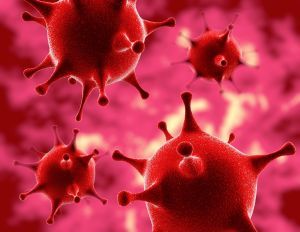Chitosan against Corona? Substituted chitosan as effective inhibitor of SARS-CoV-2 and MERS-CoV

The new corona virus SARS-CoV-2 has spread globally, originating from China since the beginning of the year. The pathogen causes the lung disease Covid-19 and has been classified as a pandemic since March 11, 2020. Researchers around the world are working on the development of effective vaccinations and drugs. A current study examined the antiviral effectiveness of HTCC (N- (2-hydroxypropyl) -3-trimethylammonium chitosan chloride) in vitro and ex vivo against the new coronavirus SARS-CoV-2 and MERS-CoV.
HTCC as a highly effective polymeric inhibitor of SARS-CoV-2 and MERS-CoV
Aleksandra Milewska, Ying Chi, Artur Szczepanski, Emilia Barreto-Duran, Kevin Liu, Dan Liu, Xiling Guo, Yiyue Ge, Jingxin Li, Lunbiao Cui, Marek Ochman, Maciej Urlik, Sylwia Rodziewicz-Motowidlo, Fengcai Zhu, Krzysztof Szczubialka, Maria Nowakowska, Krzysztof Pyrc. Preprint – not peer reviewed. doi: https://doi.org/10.1101/2020.03.29.014183
The authors used chitosan (molecular weight 250 ± 100 kDa, degree of deacetylation 83%) and glycidyltrimethylammonium chloride to produce polymers with a degree of substitution of 57, 62, 63 and 77%. The inhibitory effect of HTCC against SARS-CoV-2 and MERS-CoV viruses was tested in vitro with Vero and Vero 6 cells, as well as ex vivo on human airway epithelium (HAE).
Results
- In vitro inhibition of MERS-CoV and SARS-CoV-2 (strongest inhibition by HTCC-62 or HTCC-77)
- Inhibition depends on polymer concentration and degree of substitution
- Ex vivo inhibition of viruses in HAE cultures (SARS-CoV-2: strong inhibition 24h after virus inoculation)
- HTCC polymer interacts with the coronavirus spike protein
- HTCC blocks interaction between MERS-CoV with its cellular entry receptor DPP4
- Inhibition of the virus may depend on the repeating units of the chitosan polymer
Conclusion: The study showed that the virus replication of SARS-CoV-2 and MERS-CoV was successfully inhibited by the substituted chitosan HTCC in vitro and ex vivo. Based on the results, the HTCC polymer is a promising candidate for the treatment of SARS-CoV-2 patients. Further studies are necessary.
Reminder: the study is a preliminary report that have not been peer-reviewed. Source: https://www.biorxiv.org/content/10.1101/2020.03.29.014183v1


